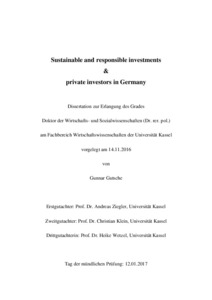| dcterms.abstract | Sustainable and responsible investments (SRI) have grown strongly over the past two decades. While corresponding investment volumes are still rather small compared to those of conventional investments, almost every conventional investment product has a counterpart applying a sustainable and responsible investment strategy (FNG 2016). In light of current developments, an increasing importance of SRI in the future can be assumed. By way of example, SRI can be an important instrument in order to achieve and implement the ambitious (long-term) goals resolved in recent climate negations like the 21st Conference of the Parties in Paris. These goals require severe efforts and changes in many economic sectors and also in behaviors of market participants. Policy makers seem to agree that these actions and developments have to be framed and accompanied by corresponding financial flows (UNFCCC 2015). Accordingly, it is important to understand determinants of individual behavior in order to find efficient, well-targeted, and socially accepted solutions and policy measures to accelerate the transformation process (e.g., Schwirplies and Ziegler 2016). However, related empirical studies mainly concentrate on sustainable individual behaviors in context of consumption and transport decisions and only a few studies consider motives and barriers of individual investment decisions in context of SRI.
The four papers of this cumulative thesis add on this limited research by focusing on the relevance of financial and non-financial motives (e.g., social norms, personal values and identity, with a special focus on religion and political orientation) for individual investment behavior and SRI, potential investment barriers, and the relationship between SRI and other sustainable activities. The empirical analyses in all four papers are mainly based on an online representative survey among financial decision makers in German households. The heart of the survey are two stated choice (SC) experiments on hypothetical investment decisions among sustainable and conventional investment products, which account for several potential drawbacks of pure questionnaire-based analysis.
The first paper finds that psychological motives, personal values, and social norms (e.g., warm glow motives and expectations of the social environment) have strong significant effects on SRI and are even more relevant than the perceived financial performance of SRI. This suggests that SRI investors gain strong non-financial utility from SRI. On the basis of both SC experiments, the second paper shows that certain types of investors are willing to sacrifice return in order to invest in SRI. Investor groups with high feelings of warm glow from SRI, strong considerations of norms by the social environment with respect to SRI, strong environmental values, and an affinity to left-wing parties have a substantially higher estimated average willingness to pay for sustainable fixed-interest investment products. The third study shows (on the basis of both questionnaire and experimental data) that particularly too high (perceived) information costs regarding SRI prevent investors from investing (more) in SRI. It further reveals that different investor types face different barriers regarding SRI market participation: Receiving no offer by their bank is a big market entry hurdle especially for interested investors, while distrust in providers of SRI is a severe issue discouraging skeptical and conventional investors. Based on the experimental data, the analysis reveals that investors of all groups have positive preferences for funds with transparency or sustainability labels suggesting that these labels are an opportunity to decrease information costs thereby enhancing individual demand for SRI. The fourth paper merges the survey data and officially available information on regional religion and political preferences at the zip code level in order to consider the relationship between investments and other fields of individual behavior, but also to examine the relevance of religion and political orientation at the individual and regional level for these activities. The econometric analysis reveals positive effects and the importance of individual and regional measures for religion and political orientation on different kinds of sustainable activities independently of their degree of observability or irreversibility. Thereby, the results emphasize the importance of individual identity and social norms for individual behavior in general.
Hence, besides its contribution to scientific discourse, this dissertation provides information for political decision makers as well as various relevant market players, such as banks or fund providers. | eng |

